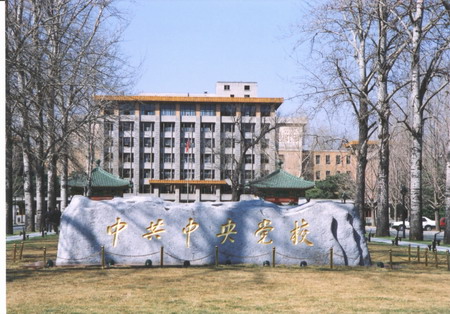Inside the Central Party School
 |
|
A view of the Party School of the CPC Central Committee. [File photo] |
Known far and wide, the Party School of the CPC Central Committee sits in western suburban Beijing. Students here are often senior officials in the Chinese government. There was once a joke circulating around the heavily guarded school: Where can you find the most careful driver in China? Answer: In the central Party School. Why? Because who knows which passer-by might become the future General Secretary of the CPC.
A joke is only a joke. But the tight security system in the school is perfectly obvious to all. Every visitor has to go through a string of security checks before finally seeing the person he or she wants to visit. The visitor should first present his or her identity papers to staff at reception. He then confirms the information with the person to be visited via telephone. When the information is validated, the staff member in reception will produce an entrance card for the visitor, which should be presented to security at the school's main gate for another examination. If the visitor wants to enter any particular building inside the school, he or she must go through additional checks conducted by security guards at each building.
Every year, the school accepts a great number of officials at the prefecture or provincial level to further their studies on political theories. Comparatively, security checks are stricter in the dormitory buildings for provincial officials. In addition to the entrance card examination visitors are also required to give the name and the room number of the official they want to visit. The guardian will then contact the official for final confirmation.
While the officials' safety is guaranteed by these measures, they are also cut off from the outside world. Their secretaries and drivers are prohibited from entering in the school. Class absences aren't permitted without valid reasons. School administrators are in charge of all leaves. Anyone returning after 11 pm must sign in at the reception desk.
"Even if someone has important business, no one wants to see his or her name frequently appearing on the tardy list," said a student. At the beginning of each semester, helping the officials to develop a sense of being students constitutes the major part of the school's everyday work.
Zhang Hulin, former director of the Administration Office of the school, recalled that in 1990, when he was in charge of a teaching and research group in the school, all the students were required to participate in physical labor after classes. Some of the students were later elected members of the CPC Political Bureau.
Today, all alarm clocks in the dormitories for provincial governors and ministers are set for 7:30 am, for this is when dorm staff members will also ring doorbells punctually to supply room service. "You can't go back to sleep in such an environment," a student complained. At first, everyone feels disoriented by this new routine but later these overburdened government leaders will find their life at school an enjoyable experience.
During the first week all students must participate in placement exams to ascertain their theoretical level. The examination subjects include all the basic theories of Marxism. Lectures are arranged in the morning from Monday to Thursday. Divided into seven teaching and research groups, the faculties in the school take turns giving lectures. For example, in a class of prefecture-level officials, the teachers of the Party Construction Group will take the first few weeks to give lectures about major meetings of the CPC, History of Party Construction and Deng Xiaoping Theory. The Social Study Group will then give lessons on ethnic and religious theory, sociology and the leadership arts. Afternoons are usually left for students to study by themselves or to hold free discussions.
In the school, there is a special class composed of young and middle-aged officials. Mainly aged between 45 and 50 years old, these students are the future backbone of the Chinese government. At the beginning of the first term, each student gets a list of the classical works on Marxism and Leninism, such as the Capital and the Anti-Dühring. In most cases, they are required to complete these books in three months. Lectures for this class usually last one year and the Organization Department of the CPC Central Committee will frequently send staff members to sit in on their discussions, with the aim being to find the best students in the class to recommend for future promotion.
A professor at the school revealed that once a student was suspended from lectures for misbehaving in class. "His political future virtually came to an end after the event," said the professor. According to statistics, around one third of the students in the classes for young and middle-aged officials have been promoted as leaders at the provincial or ministerial level in their later life.
At the school, students are required to watch anti-corruption documentary films, participate in performances and sing songs with revolutionary themes. "Of all lectures I received on Party theories, those in this school left me with the deepest impression," said a former student of the school.
When CPC's newly elected General Secretary Hu Jintao was in charge of the school, he stressed that all government leaders, no matter what official titles they held, should follow the rules and regulations of the school, because their primary identity here was as a student.
 0
0 






